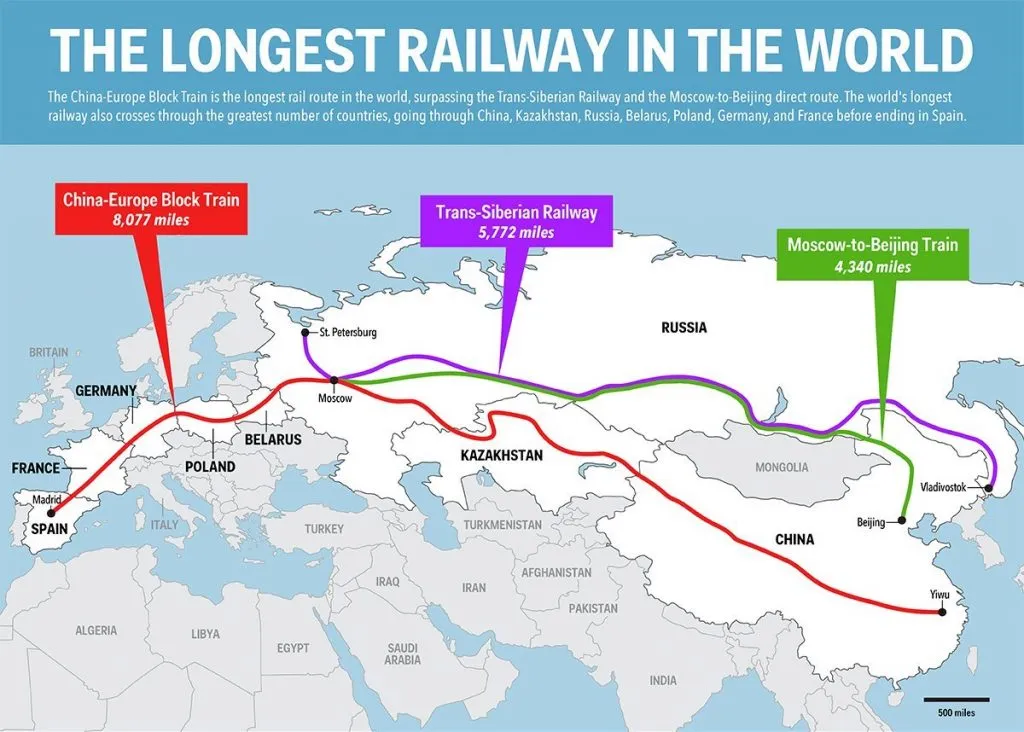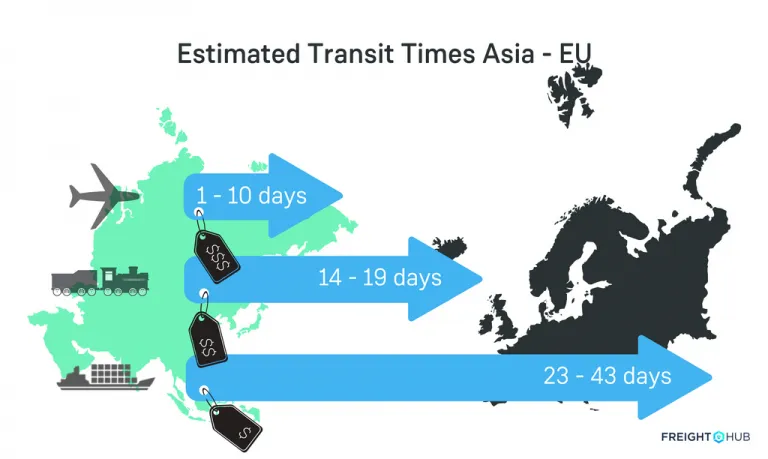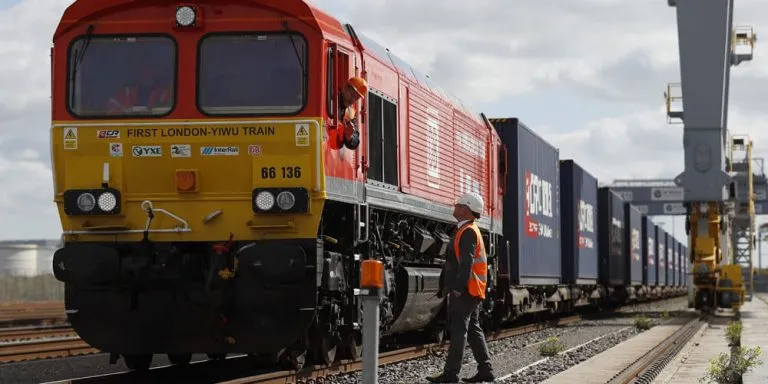Email
1001@tiandot.com
Email
1001@tiandot.com
As an example:
In recent years, China Railway has shipped freight through the famous Silk Road railway that connects 12,000 kilometers of track via the Trans-Siberian Railway.
An exciting project has just been set up: the first train from Yiwu to London (Barking in East London). He left on the 1st of January and arrived at destination on the 18th of January, which represents an average transit time of 18 days to get to London, more than the 15 days to get to Lyon. As a reminder, keep in mind that a container needs at least 30 days to reach the French ports.
This new service which is offered both for importers and exporters allows to ship to and from China in a fast and cost-effective way.
Note TianDot: This service represents a potential direct saving of 50% compared to an importation from China by air freight. It represents also a time saving of 12 to 14 days compared to sea freight.
There are two key rail links / routes: the first one starts in the north of China and connects with the famous Trans-Siberian (Russia), the second goes west through Kazakhstan before catching up with the Trans-Siberian Railway in Yekaterinburg, which is a key junction for rail freight in the Western part. In addition, these routes provide logistics solutions for the shipment of oversized objects (also called Project Cargo).
Here are some examples:
shipping is proud to offer these kinds of services, enabling you to save time, money and troubles.

CHINE – EUROPE: The longest railway in the world !
The cost of rail freight from/to China is potentially 50% cheaper than air cargo for the same trip. The transit time is 45% to 50% shorter, as compared to sea freight transport.
Customs declaration and inspection can be proceeded much more quickly than in the case of air or traditional sea freight. This customs service is available in the form of a full service 24/7, handled by our team present in China.
A wide variety of goods is accepted for transportation and the services offered include: door-to-door deliveries, FCL and LCL, classic and dangerous goods.

Not a boat, not an airplane, but a train. The first freight train from China to the United Kingdom is now running. This new route of silk used by the intercontinental train is a new means of transport between the two continents and offers many advantages.
The main benefits of this option is its short delivery time and obviously the lower costs it offers. Indeed, the delays provided by rail freight are way shorter than sea freight and less expensive than air transport.
In recent years, the rail link between France and China has become a wise choice for customers concerned about delays and costs. As China’s economic power keeps on increasing, some French companies have decided to implement their production facilities there, benefiting from the booming Chinese market – this is why there is a high demand for railway freight.
Railway Freight is a perfect option for customers who need to deliver components and industrial products from France, Switzerland or Belgium to China, and vice versa. In addition, the two railways present on the Eurasian Land Bridge serve destinations in Russia, Kazakhstan and Mongolia.
The continued expansion of the rail network in China and the further simplification of customs procedures reinforce the importance of a direct rail link, as trade between Europe and China is growing.
Currently, four weekly container train services from Duisburg and three weekly services from Hamburg serve China, in addition to the regular services from Wackersdorf and Leipzig-Wahren.
The new service from Duisburg crosses Poland, Belarus, Russia and Kazakhstan to the Chinese city of Chongqing, one of the largest industrial centers in the country located in Sichuan Province, offering excellent connections.
Freight trains cover a huge distance of 12,200 kilometers in 16 to 20 days, while traditional wagon trains take between 22 and 25 days to arrive at the final destination.
The train carries up to 100 TEUs (20 foot equivalent unit) and can carry 40-foot GPHC containers as well as standard PWHC containers. All containers are equipped with a GPS tracking system and an alarm function.
We can consider the distance of the trip as a new silk road, made up of 10 200 km of rail. This is the distance travelled by your packages when shipped from Chengdu ,China to Lodz, Poland.
About 4 different shipping companies will be involved in the transportation of your parcel. Operators from China, Kazakhstan, Russia and Germany will be part of it. Getting the vehicles ready to transport the containers, as well as loading and unloading processes can be quite long.
Therefore, it is normal to experience potential delays, as a large number of factors and actors are involved in the logistics chain.
Generally speaking, rail freight takes 2 to 3 weeks to reach its destination. Often, railway transportation requires changing wagons, for example when entering the Russian territory, as there are different types of rails according to the countries.
The main advantage of this rail freight is that it comes with a full security of your parcels. In fact, once loaded, they are sealed and are not opened until arrival at the final sorting center.
However, a delay can quickly happen if one of the trains encounters a problem on the way, if there are too many orders for the same destination. If a parcel is damaged or source of problems, it will obviously cause a delay on the other parcels.
Note TianDot: Keep in mind that millions of parcels are being shipped every month from Asia and the overwhelming majority of these shipments reach their final destination without any problems. The only thing to do when the order is made is to be patient!
For centuries, the legendary trade route of the ancient capital Xi’An made it possible to connect the biggest markets of that time, such as Istanbul and Venice. Thanks to these international trade links, China was already one of the biggest global player on the market.
Since then, the country is still building on that record. In the 21st century, China has become the world’s largest exporter, accounting for $ 2.28 trillion (£ 1.85 trillion) in 2015.
The business generated by the country is crucial for the global economy. However, these strong economic activities are not possible without reliable and efficient logistics services.
TianDot Tips: For this reason, the railway extension linking Europe and Asia is part of President Xi’s trade policy “One Belt, One Road”. For Chinese government, this is a way to maintain China’s economic growth.
Not a boat, not an airplane, but a train. The first freight train from China to the United Kingdom is now running. This new route of silk used by the intercontinental train is a new means of transport between the two continents and offers many advantages.
The main benefits of this option is its short delivery time and obviously the lower costs it offers. Indeed, the delays provided by rail freight are way shorter than sea freight and less expensive than air transport.
By connecting two continents, the new intercontinental train crosses several countries and uses a specific route.
In total, the railway covers 11,300 kilometers and crosses Germany, Poland, Russia, Kazakhstan and China. This route regards transportation from England to China only.
TianDot Tips: As for the frequency of departures, there is a weekly departure for China, and several other trains leave China to reach European borders.
The first stop is in Yiwu, east of China, and the last stop is in London. The whole trip lasts two weeks and to get to England, the train always crosses the same countries: Kazakhstan, Russia, Belarus, Poland, Germany, Belgium, France …
Railway freight is a good alternative for entrepreneurs and companies operating internationally: cheaper than air freight and faster than sea freight.
If you or your company want to benefit from a cheap and fast delivery, the train has now become the perfect solution, offering an efficient and reliable logistics service. It can quickly become very profitable for French and European companies operating on a global scale.
My name is Ethan Wu with 15 years experience in freight forwarding industry, I started my career in KN from 2004 focus on sea freight and consolidation business in niche market like South America, later on I move forward to railway sector from 2013 focus on central Asia, Mongolia and Russian market. I’m also a specialist of Europe, especially France and Poland.
Railway transportation capacity is strong, suitable for centralized transportation of bulk materials and the scale of railway transportation is economical and the unit transportation cost is low. It’s also environmental friendly with less pollution.
Before China Europe train was born, China has been exporting and importing shipment from/to Central Asia and Mongolia by rail freight by using container, different type of wagon or even rail platform since long time ago, there are 2 major port : Qingdao and Tianjin are traditional port for multi-modal transportation where Asia cargo use this route with destined to Central Asia (such as Almaty, Tashkent…etc), and Mongolia via these 2 ports.
After China Europe train was born and getting more popular, reliable with stable schedule is the most significant benefit why customers choose railway as their primary method for their cargo. With direct train service from China to Europe, vice versa. Customers has no longer to wait few days at transit hub, with potential risk for cargo damage when reloading goods,
Customers have been changed shipping habit and no longer to use sea-air service, China Europe train service become a must option in modern logistics solution, besides sea freight and air freight.
China Europe train is not just design for exporting/importing cargo from/to China, but also an essential option for cargo origin from Asia cities with destined to Europe, it’s faster transit time while shipping line are more going to slow steaming program.
Currently there are more than 15 main China cities (such as Zhengzhou, Chongqing, Chengdu, Wuhan, Hefei, Changsha, Yiwu, Xiamen, Shenzhen, Suzhou, Xian, Shenyang, Harbin……etc) have rail freight connection with arrival more than 16 main cities in Europe. Cities(photo as below)
Trains in China and Russia run an average of 800-1100 kilometers a day, compared with 250-400 kilometers in Europe. The number of containers per train varies from 41 in China. Train will be reloading 2 times in China Border and Belarus border during whole journal because of different gauge, but it’s low risk than others, because railway require high standard in terms of container loading mechanism, cargo weight, loading sequence…which is more strict than other transportation. This is one of reason high value product like Electronic components, mechanical and electrical products, high fashion clothing are the main commodity catalogues in China Europe train.
Apart from normal dry container, China Europe railway also allow other type of container and type, such as reefer container, open top (hard) container. These containers has no difference than sea container in terms of dimension, capacity and max playload, as they are also under ISO standard.
Because we are the best in terms of services, price and follow up.
Hope you will get in touch with TianDot Shipping soon!
In its new trade campaign with Europe, China calls this railway “The New Silk Road”. The Chinese railway line already serves several other European cities, including Hamburg and Madrid.
On January 3, 2016 in Yiwu, a train carrying 44 containers of suits, clothes and many personal effects began a 12,000-kilometer journey to Europe.
At the end of this shipments, ten containers were removed at the German freight terminal in Douisbourg. The rest was removed at the Freight Eurohub terminal at Barking.
Info: Last year, 1702 freight trains made the trip to Europe, more than twice the number of freight trains in 2016.
The British giant TESCO does not carry goods on this train from Europe to China, but widely benefits from the rail network that has become strategic for the transport of its goods. The company transports toys, electrical equipment, household goods and clothing from China to various railway hubs in Bratislava, Slovakia and Krasnaje, Belarus.
Alistair Lindsay, Director of Global Logic Tesco, affirms that the group prefers to use sea freight as it’s the most environmentally friendly and cost-effective option. However, she added that they need to transport goods quickly, they opt for railway freight.
This is a proof of the benefits of this new means of transport between Asia and Europe. Globalization is generating new needs, enabling Chinese President Xi Jinping to make his dream come true : to revive the Silk Road and intensify trade relations with Europe.
Kazakhstan is one of the countries crossed by the railroad and this is where Mr. Xi had outlined his vision in a speech in 2013. He already mentioned this huge project would work to the advantage of all the countries involved in it. Globalization has to come with efficient logistics infrastructures, and China understood it immediately.
This trade route is getting more and more attractive for its economic and logistical advantages, especially for companies that set up frequent trade links with China.For others, it represents also strong political issues, allowing China to prove its influence on various countries, from Russia to Spain.
Info: China is also developing its “Maritime Silk Road” version by building a port city in Sri Lanka for a total budget of $ 1.4 billion.
The world is now facing other critical issues. Pollution is one of them. Although rail is not as environmentally friendly as sea freight, it still emits less CO2 than an air freight. In total, freight transport accounts for 7% of global greenhouse gas emissions. On the other hand, it is not always easy to determine the exact proportions of the carbon footprint according to the different modes of transport.
Even if the substitution of air freight by rail freight significantly reduces CO2 emissions, sea freight remains the best option as far as carbon emissions are concerned (most ships operate at low speed to save fuel and thus pollute less).
For many European entrepreneurs, China and the new means of transport that the country provides are factors of growth, as well as interesting economic and commercial opportunities.
“Brand Avenue” is a company that exports made-in-England products to China (cosmetics, jewelery, etc.). Its director Jody Jacobs said he was exploring the new rail transport opportunity. « We are distributing a lot of heavy goods despite their low volume, which are too expensive for air freight, such as cosmetics and baby food.” Thus, a service which is faster than sea freight and less expensive than air freight is the best and the most cost-effective option.»
For companies that export / import goods internationally, rail transport offers significant growth potential.
Shipping lines have seen their profits decline, which is partly due to overcapacity after the global financial crisis occurred.
The world’s largest shipping company, Maersk, announced to the BBC the possible use of railway freight for long-distance shipments as an alternative to air and sea freight.
Tips: China is planning about 20 other rail routes for the transportation of goods. With the growing global demand for consumer goods, all the parameters seem to be in place to help the global economy take advantage of these new international transport infrastructures.

TianDot Shipping is a multilingual freight forwarder based in China. The global company has become an important logistics player in China and is also thinking of developing its strategy around the new means of transport linking Asia to Europe. The intercontinental train is a real opportunity that offers many advantages, as mentioned above : cheaper than air freight, faster than sea freight, and environmentally friendly.

 简体中文
简体中文